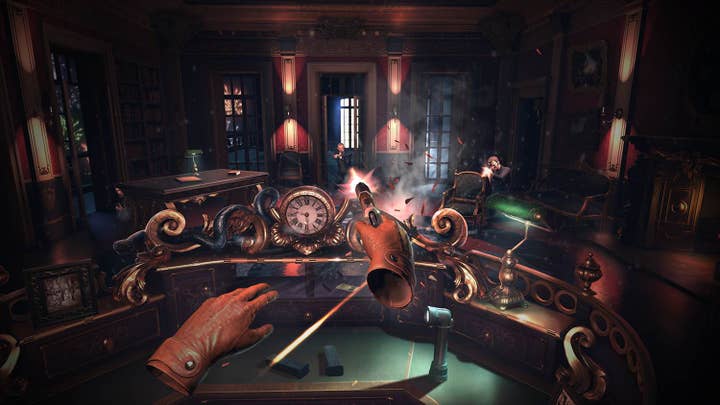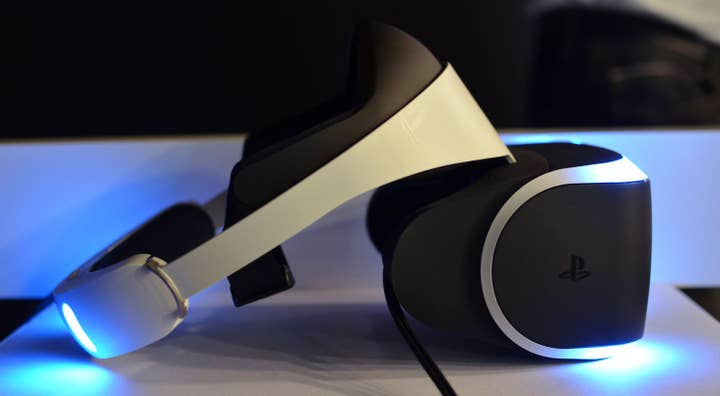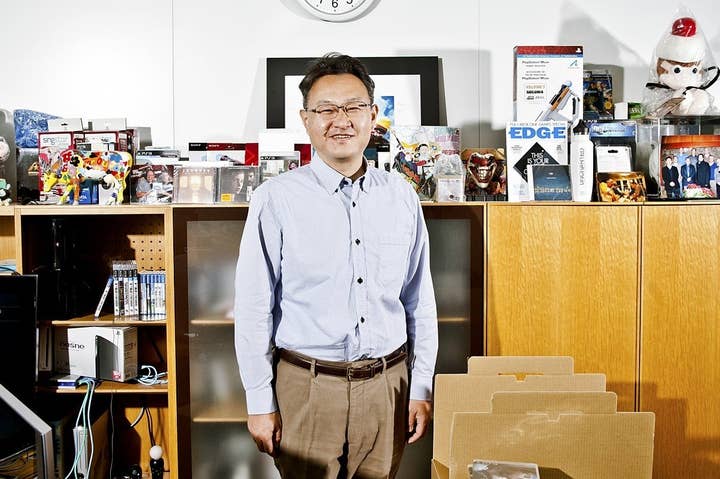Yoshida: Morpheus is a "grassroots project"
The president of Sony's Worldwide Studios shares his hopes and concerns for the virtual reality headset
Shuhei Yoshida, president of Sony's Worldwide Studios, knows what he wants from virtual reality. He loves travel, there are places in the world he wants to see but doesn't want to do a two hour hike to get to. Virtual reality is his answer. Oh, and he'd like to sit down and spend time with a "very attractive person" for an intelligent conversation. He thinks we'll see those things in a few years.
He told me this in a GDC cubicle right after my first experience of Morpheus, where I shot at gangsters and was almost savaged by a ravenous shark. Alongside Richard Marks, senior researcher at Sony Computer Entertainment America, he explained why Sony was relishing the competition from Oculus and Valve, and why virtual reality fans should keep an eye on Sony's E3 presentation.
The core hardware is done, pretty much, but there are lots of details that the engineers...they want to change this and that, in both hardware and software, SDK and drivers, and so that will continue until the launch and on the software side after launch as well.
So that defines the launch window because we wanted to make sure that the target specs that we wanted to achieve are the latest, latest, latest tech, hot from the factory, so we needed to make sure it works very well with the whole system. Now we have verified it, now we know the process until the manufacturing and the launch. So that defines the schedule, it's not much different from supporting new PS4 developers so I have no concern.

Of course the most important thing from now until the launch is to get more games to make. Actually, indie devs are so excited to make VR games - and thanks to the architecture of PS4 being based on PC it's very, very easy to move PC content using Oculus over to Morpheus.
We are very friendly with the Oculus guys, I've been publicly saying that anyone working on VR content on PC using Oculus is prototyping for Morpheus games. So I'm like thank you Oculus for providing so many kits at affordable prices. [Laughs]
The biggest challenge, I say, is to get people to try it. Once you try it you get excited. So we need more people to be really excited and talking about it to their friends. Last year we couldn't do it because last year's kit was less stable. We needed to have lots of people to kind of support it. This is going to be mass production kit towards the launch so we'll able to ship to many different places, different events and to get as many people to try it.
It's a challenge - you can't broadcast VR out there without having the hardware so we need to get it in front of as many people as possible. I think once we get it into the homes, once we actually start selling it, that's when you'll see this explosion of people being able to show it to their friends.
"We are very friendly with the Oculus guys"
One thing we designed as a feature into Morpheus is to let your TV show the clear picture of what the person wearing the headset is doing. So we can design games, like a Wii U game, one person is holding the big controller and the other people are watching the big TV, three people are using the DualShock 4, playing with the person in the headset or playing against the person in the headset.
So we don't have the demo like that today but we are planning to show some examples of that at later events this year.
You won't take my word for it, but we have many teams working on games that we have not talked about, so we'll start to show games at E3. This is a handmade prototype, the numbers are very limited now, so that's why we chose London Studio and Japan Studios, they are kind of doing this AR, VR things for the longest time. So they are doing it almost for the hardware team, to debug the hardware, but starting in late April, May time - a spring timeframe - we will start to manufacture more for all the developers so that they can create games or port games they are making using last year's kit, for E3.
So we have plans to bring some of the first-party games that we haven't shown yet to E3, as well as our third party relation teams talking to third party developers to bring their games to E3.
What we are aiming for from a business standpoint is we need to hit the minimum threshold in terms of install base so that developers can recoup their investment. Day one we probably won't need millions and millions of install base because unlike console games, where developers can spend $50 million to make one game, with the VR experience, the teams that are working on the VR games are really having fun withsmall teams and trying out different ideas, iterating.

Because the experience is so new we feel that we can have small experiences in digital form. Someone suggested that the London Heist [a demo for the Morpheus that had a Lock, Stock and Two Smoking Barrels feel] we might be able to make into an episodic game series and sell it for cheap, each episode. So that kind of thing will work.
I don't expect big companies to invest big from day one, to create one game, because we don't know enough about what works. So instead I'd like to see many companies, even big companies, have small teams to create some small experiences and start releasing digitally on the store so they can learn and people can spend a little bit of money to have a variety of experiences.
Well it's unusual for a big company like Facebook to as well…
"I don't expect big companies to invest big from day one, to create one game, because we don't know enough about what works."
We don't know about other companies but for us it's really a grassroots project. They invented PS Move for PS3 and when our teams got PS Move was about instead of making Move games they started to make the VR headset. So they purchased a HMZ, Sony's movie head mounted display, and attached a Move. Then you can actually use it like a virtual reality headset.
So they started making VR games on PS3 as a hobby, in the weekend or at night. That happened in multiple studios and we said "so many people want to do this, PS3 isn't powerful enough but let's target PS4." That's how we started this project, so it's not like a big company strategy, it's more like an indie startup kind of feel.
It's like a passion project but the passion is shared by a large amount of people.
And we were talking with Palmer [Luckey] before he started Oculus as well, like a hobbyist to hobbyist network.
"Engineers tend to think they are the best right? But when they see some other guy achieving something better they are very honest and say 'OK, we should work harder'"
Yes because we really, really, really want to see this happen. We feel like we are working towards the same goal.
Well actually on the technical side it's a great competition. Engineers tend to think they are the best right? But when they see some other guy achieving something better they are very honest and say "OK, we should work harder." So that's happening, Oculus have been showing some tech before we did, like OLED, and we showed Morpheus with 3D audio and 360 tracking before they did, so these things are very very helpful for the tech teams to try harder.
But in terms of business we are console. There are console gamers, there are PC gamers - they always want the highest tech, they are going to spend lots of money and time to download drivers, upgrade graphics cards, but we are catering to people who don't want to do all that. Console is always like that, you purchase hardware, you buy game, and it works. So this is the same approach we're taking with Project Morpheus. We want to really make sure that people who buy Morpheus can set it up by themselves and download or purchase a game and it works.

